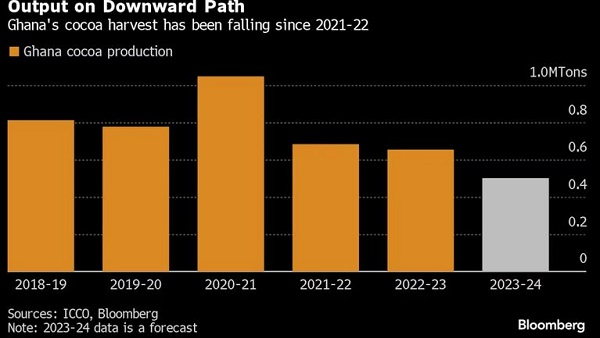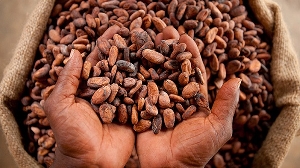Ghana’s cocoa industry regulator is negotiating to raise the price it pays farmers for their cocoa by 65% for the season that started at the beginning of this month in a bid to curb smuggling.
Ghana Cocoa Board is in talks with the government to approve an increase to 54,656 cedis ($3,488) per ton, or 3,416 cedis a 64-kilogram bag, according to people familiar with the matter.
Driving their decision is the expectation that neighboring Ivory Coast will hike its prices substantially, and if Ghana’s prices don’t keep up, its beans risk being smuggled over the border, the people said, asking not to be identified because the talks are not yet public.
Ivory Coast has yet to announce its price plans, and a spokeswoman at the country’s Le Conseil du Cafe-Cacao did not respond to requests for comment. Spokespeople at Ghana’s Cocobod and the Ministry of Food and Agriculture declined to comment when they were contacted by phone.
The two countries are the world’s leading cocoa growers. Benchmark New York futures for the crop doubled in the past year to more than $7,000 a ton after poor harvests there, but farmers in both nations — where pay is set by the government — receive far less. Boosting the price would reduce the incentive to sell beans across the border or hold back supply and could eventually help farmers invest more in their plots, easing the global shortfall.
Ghana started the 2024-25 season a month early as it sought to prevent farmers from selling stocked cocoa to neighboring buyers, Bloomberg reported last month.
The country’s harvest has been falling in the last three years mainly due to weather, disease and a lack of inputs but also smuggling of the beans. Against a production target of 850,000 tons in the season that ended in August, the International Cocoa Organization estimates the tally would only be 501,000 tons.
Any increase in the farmgate price less than 65% would not be enough to discourage the illegal exports, the people said. Ivory Coast may raise its rate by 33% to 2,000 CFA francs per kilogram, they said. The depreciation of the Ghanaian cedi to the US dollar has eroded the value paid to growers.
The regulator is struggling to raise funding to buy the beans from farmers in the new season amid uncertainty over the crop output. The Cocobod, which initially sought to raise $1.5 billion in syndicated loans from international banks is now negotiating for $600 million. It’s also in talks with cocoa traders for a short term loan of $500 million.
Ghana will announce the new farmgate price later this week, the people said. A lucrative jump will likely favor the government in the sight of the over 800,000 cocoa growers ahead of the Dec. 7 presidential polls.
Vice President Dr. Mahamudu Bawumia of the ruling New Patriotic Party will face off against former president and main opposition leader John Dramani Mahama, as Nana Addo Dankwa Akufo-Addo will step down after his second and last four-year term.

Watch the latest edition of BizTech below:
Ghana’s leading digital news platform, GhanaWeb, in conjunction with the Korle-Bu Teaching Hospital, is embarking on an aggressive campaign which is geared towards ensuring that parliament passes comprehensive legislation to guide organ harvesting, organ donation, and organ transplantation in the country.
Click here to follow the GhanaWeb Business WhatsApp channel
Business News of Tuesday, 10 September 2024
Source: bloomberg.com

















